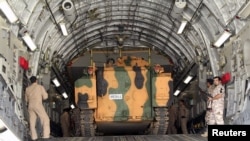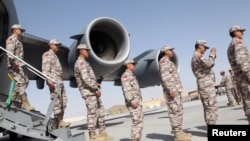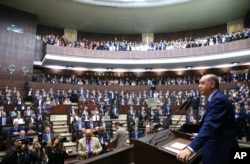Turkey is continuing to be drawn into the crisis between Qatar and Saudi Arabia and other Gulf States over Doha's alleged support of radical Islamic groups in the region. Ankara is strongly backing Qatar and has ruled out ending it's recently established military ties.
On Thursday, five Turkish armored vehicles and 23 military personnel arrived in Doha as part of an agreement to establish a military base with more than 5,000 soldiers. But the base's closure is one of the 13 demands Riyadh is making on Qatar, to end the crisis.
Friday, the Turkish defense minister, Fikri Isik, in a televised interview, shot back.
“Re-evaluating the base agreement with Qatar is not on our agenda,” Isik stressed, adding the deployment is not aimed at any other country and should be seen as contributing to regional stability. Commenting on the reported demands for the base's closure, he said, “If there is such a demand, it will mean interference in bilateral ties.”
The agreement to establish the Turkish military base dates back to 2014 and is part of Ankara's wider strategic goal of extending its influence.
“It [the military base] was significant because its gives Turkey a foothold in the region,” notes political columnist Semih Idiz of the Al Monitor website. “But after the Qatar crisis, the way Ankara rushed through legislation allowing the deployment, it's a very clear and open overt sign of support for the emir of Qatar, what ever the Turkish defense minister says.”
In the forefront
Turkish President Recep Tayyip Erdogan has been in the forefront of backing Doha, calling the Saudi-led embargo against Qatar a “death penalty.” Along with deploying soldiers, Ankara has been leading efforts to break the embargo, sending thousands of tons of supplies.
“Since June 5 exports to Qatar have amounted to $32.5 million. Of this $12.5 million is food. This figure is three times the normal level,” announced Turkish Customs and Trade Minister Bulent Tufenkci Thursday. The breaking of the embargo has seen Ankara even forsake regional rivalries with Iran to coordinate their efforts.
“This is an artificial crisis, when it comes to accusations of financing or supporting fanatical Islamic groups, this is not a monopoly of one country in the region. You can't let one country dictate to another how it should behave. We've seen this so many times in history,” points out Mithat Rende, the retired Turkish ambassador to Qatar, robustly defending Ankara's stance.
But Rende, acknowledges such a stance marks a break with the past.
“Traditionally the Turkish establishment's policy towards the Arab world and Gulf was to stay outside of inter-Arab conflicts and stay out of sectarian conflicts. But things have changed.”
Ankara's siding with Qatar has seen some former Turkish ambassadors warn that it undercuts any role Turkey could play in mediating in the crisis. Despite such concerns, few expect any change in policy.
Future rewards
“We know President Erdogan is impulsive in these situations and there are now no checks to his decisions, and we now have another example of this. This is the president's decision and he is famed for not listening to his diplomats,” observes columnist Idiz. “Taking a back step would not only amount to lose a face, it would leave Turkey looking as an unreliable partner having gone out on limb for Qatar.”
While such loyalty to Qatar may reap some rewards in the future, the shifting sands of the region could ultimately see Ankara also paying a heavy price. Experts point out that Arab counties invariably do resolve their disputes and successfully move on, but tend not to be so forgiving to any outside party that chooses to involve themselves in such disputes.
“If a third party, be it Turkey, United States, you name it, try to be part of the dispute, then they may end up feeling isolated. This is a risk,” acknowledges retired Turkish ambassador Rende. “But Turkey cannot, should not remain indifferent. It's our geography, our neighbors. You cannot deny basic rights and freedoms to these people.”













